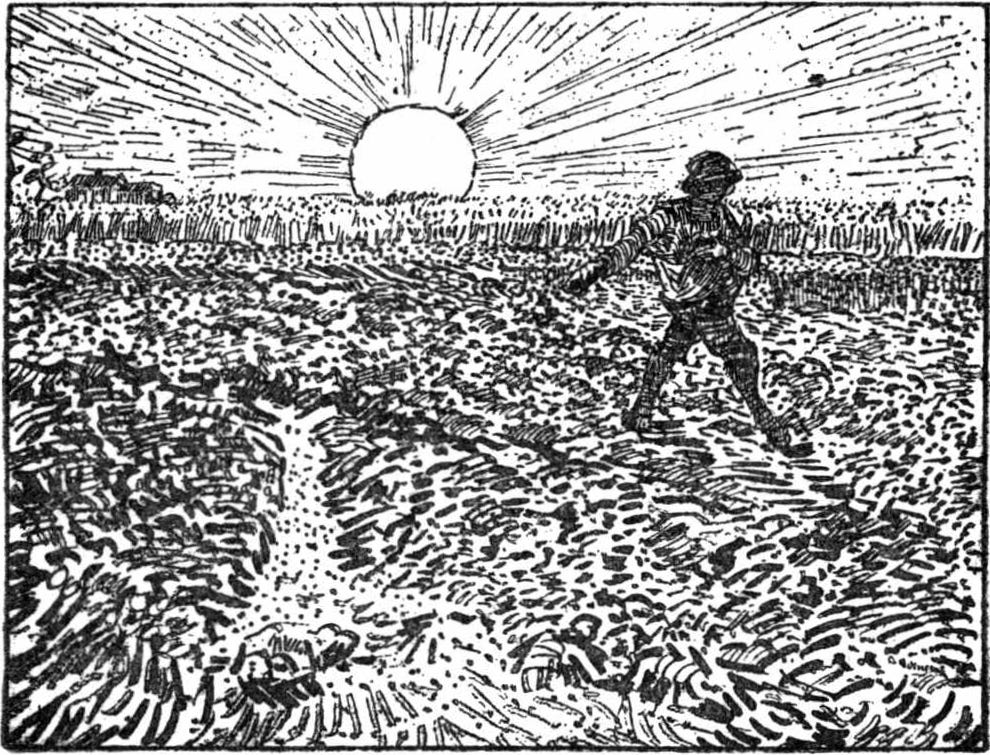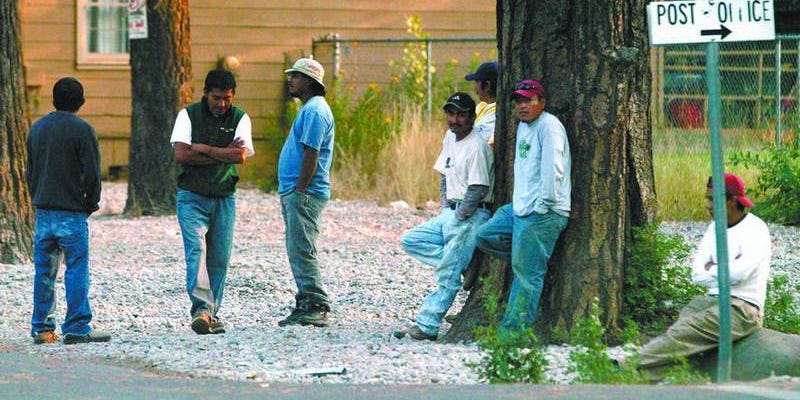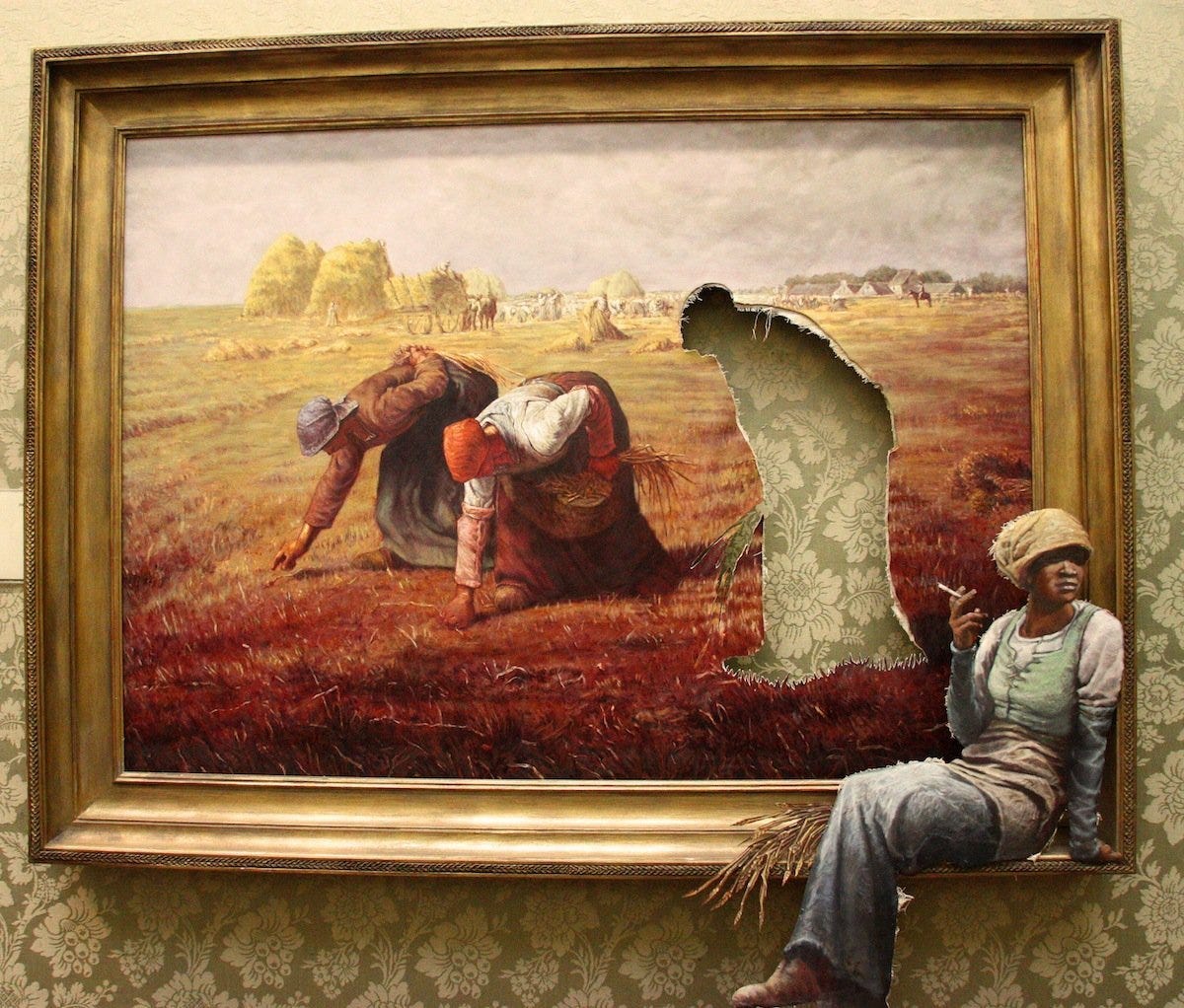Your work is not a commodity. It's your reason for being here.
A brief sketch of Rudolf Steiner’s radical insights into labor
...to live is to work, and the only thing that lasts
is the work; start then, turn to the work.
Throw yourself like seed as you walk...
— Miguel de Unamuno
Listen to this article | Read this article in Spanish
Calling
These days, most of us don’t have a vocation but a job. This isn’t because we change our work so frequently (basically every 3-5 years for the average American), but because we work for money. Let me explain.
The word “vocation” comes from the Latin vocare, which means “to call.” To have a vocation then, really means to have a calling. So it doesn’t matter if our work changes — our calling isn’t necessarily related to just one task, it can be a thread weaving through many — what matters is the way we listen to our calling.
This calling has to do with our destiny; it brings us in touch with how we’re meant to serve. The 20th century spiritual philosopher Rudolf Steiner, described this calling as one’s karma. For most of us, it’s always hard to hear this calling, but it becomes almost impossible when we work for money — when money becomes our main objective. When this happens, money replaces our interest in the work itself. We no longer pay such keen attention to whether a given task is our work. We let money speak, and fall deaf to what stirs and calls within us.1
Dignity
Not only does working for money sow confusion into our life’s path, it also degrades our dignity. It puts us on a leash and makes another the master of our fate. It can be hard to see this today — largely because its sharp sting has been softened by the labor movement’s achievements — but even though our conditions are better, the underlying power dynamic is the same. Here’s how the early 20th century labor activist Arturo Giovannitti described this dynamic:
The man that owns the tool wherewith another man works, the man that owns the house where this man lives, the man that owns the factory where this man wants to go to work — that man owns and controls the bread that that man eats and therefore owns and controls his mind, his body, his heart and his soul.2
When we buy and sell labor, we treat an essential part of the human being as a commodity: the employer buys, and therefore owns, the employee’s labor. Though it’s considered “normal,” when we pay attention to this we can feel how it violates our sense of dignity. For example, have you ever seen day laborers waiting for someone to hire them? It’s fundamentally different than the street vendor hawking their wares. One is selling a commodity they’ve made; the other is forced to sell themselves.
Rudolf Steiner draws our attention to the fundamental dynamic that’s present:
Today we have as a remnant [of slavery] just that which disturbs the working-man so much, namely that his power to work is sold; in this way something belonging to him is organized from outside. This must go; it is only possible to organize socially what does not integrally belong to the human being, such as his position or the function to which he is appointed, in short, something which is not an inner part of the individual.3
So we can see that when we buy and sell labor, human beings are inextricably caught up in the process. It simply can’t be done with the same sort of detachment with which we buy and sell goods. It’s always personal: wherever our work goes we must go also.
Truth
Before turning to the question of how to address this issue, let’s look at one other aspect — the truth of what’s actually taking place.
Human labor shouldn’t be bought and sold as a commodity because it’s not a commodity. This is where our ideas have failed us. As economic thinkers, we’ve allowed everything to be bought and sold without concern for its true nature. But this simply ignores the underlying reality.
When we buy labor with money, we’re trading work for goods (which is all that the money represents). But work and goods aren’t the same thing — they’re apples and oranges. They can’t actually be exchanged for one another because there’s no shared standard of value. Goods are the result of work, not the work itself. The distinction is clear: goods are the product, work is the producing.
Steiner calls such an exchange a “living lie” — we treat something as a living reality that has no reality to it. The truth is that every economic exchange is actually an exchange of goods for goods, we’ve just obscured it. When two people trade goods — say, bread for soap — they trade the results of their labor. Even when someone buys the soap for money, the money is still just a stand-in for their own goods.
But imagine the soapmaker didn’t produce the soap on her own, she made it with her family. When she goes home and pays her family members, she’s not paying them a wage for their labor, she’s splitting up the collective earnings from the goods they collectively produced.4 And that’s what actually takes place in every company, all the time. Here’s Steiner again:
Within capitalist economics… work has become a commodity which the employer buys from the employee. An exchange is made: money (representing goods) for work. But such an exchange is actually impossible — it only appears to take place. In reality, the employer receives goods from the employee which can only be produced through the worker’s time and effort. The production of goods comes about through the collaboration of the employer and employee. The worker receives one part of the equivalent value of these goods, the employer the other… In a healthy social organism it must be clear that work itself cannot be paid for — work cannot receive an economic value as if it were a product. Only the product itself, the result of the work, can be assigned an economic value in relation to other products.5
Health
This brings us to the question, How should we treat labor so it becomes healthy? How should we treat labor so it’s true to its own nature, doesn’t degrade our dignity, and empowers us to follow our calling?
We can look at this question both at the level of society and the level of the individual. At both levels the ideal is the same — to separate work from income — but we can approach it in different ways.
Starting with the individual: We can do everything in our power to hear our calling. On the one hand, this means attuning ourselves to beauty, because the beauty we can see is the beauty we’ve been given to serve. But it also means trying to see the beauty in all tasks, however low we might find them. Can we come to see everything in the world as worthy of our devoted service? Can we learn to fall in love with the world?
On the other hand, we need to stop working for money. This doesn’t mean we shouldn’t receive support, it means we shouldn’t make our labor contingent on support. Before taking up any task we can ask, Would I do this even if I didn’t get money for it? If not, can we find some other task we feel called to do entirely, regardless of what it pays?
Yes, this might very well mean living off less — that life won’t be as comfortable.
Social progress depends on the recognition of this sentence, that people should not want the results of their work in the form of personal pay… People must not want to have anything for themselves as a result of their work. A person owes work to society. People must limit their existence simply and purely to what society bestows on them.6
But even if life becomes outwardly less comfortable, when you find work you believe in, then life becomes inwardly suffused with greater meaning and joy.
(And it’s worth noting that Steiner himself worked in this way, at least from what can be found in some biographical sketches.7 For instance, when he took up a teaching post at the Workers’ Training School in Berlin, he never asked what he’d be paid and started the work before they ever told him. When his classes then became hugely popular, and the school wanted to compensate him for all the extra tuition he was bringing in, he refused to have his income tied to his work and said they should share the additional funds between all teachers.)
Of course, many people are so hard up that they have no choice, they simply have to work for money. They have to feed their family, and so they have to work jobs they don’t feel connected to. So let’s look at this issue at the societal level. How can we separate work and income systemically so that everyone can live a dignified life?
It can be hard to imagine this at a larger scale, but there are a number of examples where it’s already happening.
For instance, the Camphill movement — which has over 100 communities around the world and primarily takes care of people with special needs — has worked with this ideal for the last 80 years, supporting members of the community according to their needs and not according to the work they perform.
But the most commonplace example is the military. Historically, soldiers haven’t been paid a wage for their work, instead they labor on behalf of the whole and receive a livelihood that’s adequate to their needs. Steiner himself pointed to this:
It immediately produces unhealthiness in the social life when the human being is so placed into society that he is paid for his labor according to whether he does much or little. The human being must derive his means of existence from a society quite differently constituted. The soldier receives his maintenance, then he has to work; but he is not paid directly for his work, but because as a human being he holds a certain position. That is the point. That is the most essential social principle, that the produce of labor should be completely separated from the provision of maintenance.8
Of course, however large such undertakings might be, they are still isolated examples. Is it possible to realize this principle at the highest level, at the level of the whole society? Steiner knew it was, we simply have to recognize how toxic and untrue the current dynamics are and then develop the will to transform them.
When we do, we’ll come to see that our work isn’t a commodity. It shouldn’t be bought and sold on the market — in fact, labor shouldn’t be determined within the economy at all. Human dignity shouldn’t be subject to economic forces, the economy should be subject to the requirements of human dignity. Therefore, the work a person performs should be determined in conversation with the community — in the realm of self-governance where everyone is equal.
The nature and extent of the work which a person carries out in service of the social organism must be determined by his capacities and the requirements of human dignity. This can only occur if work is regulated by the government independently of economic management.9
Before a worker enters the factory or workshop, the government has determined his or her work, and the government has heard the worker’s voice in the matter through democratic principles.10
Until this happens, until we separate work and income, work will continue to be drudgery for most people. Just think of everything you’re wearing right now — did any of the people who made your clothing really want to? Probably not, but why not? Is there anything inherently degrading in making clothes for others? Of course not. It’s a beautiful and needed service. It only becomes degrading when we’re forced to do it.
Not only will work be drudgery as long as we don’t separate work and income, it will also be uneconomic. When we don’t care about a person’s true calling, then we never develop the gifts they have that could benefit us all. What we need to do is recognize that working out of love is far more efficient and productive, and then find ways to cultivate such love.
Perhaps love for our work can arise if we feel we belong to a society with its ideals intact — a society that sees work not as something degrading to the human being (a ‘necessary evil’), but as something that can lead to our highest ennoblement. Such a society would be based on a true respect for each individual. It would treat work not just as a means to fill our bellies, but as a calling that asks us to fulfill our true spiritual purpose.
“There is nothing more hostile to a real conviction of reincarnation and karma than the principle that a person must be remunerated, must receive wages corresponding to their actual labor.” —Rudolf Steiner, Stuttgart, 2/21/12 (from Reincarnation and Karma, p. 60).
An excerpt from Giovannitti’s address to the jury during his trial for allegedly inciting violence during the Lawrence textile strike of 1912. He was found not guilty.
Rudolf Steiner, Bern, 12/12/1918 (from Social and Antisocial Forces in the Human Being, p. 8). (Italics added.)
To clarify: when a person makes soap, they create something of economic value. If they just ‘labor,’ but no soap is made, than no value has been created. It’s like riding a bike that powers a cider press: in time your labor creates some economic value — the apple cider. But if you’re just riding an exercise bike, than you can ride for the same amount of time (perform the exact same ‘labor’) but now nothing of economic worth has been created. From this we can see that the labor itself isn’t an economic value.
Rudolf Steiner (from Towards Social Renewal, p. 53).
Rudolf Steiner, Hamburg, 3/3/1906 (from Esoteric Lessons, 1904-1909, p. 101).
See the book by Johanna Mücke and Alwin A Rudolph, Erinnerungen an Rudolf Steiner und seine Wirksamkeit an der Arbeiter-Bildungsschule in Berlin 1899-1904 (“Memories of Rudolf Steiner and his activity at the Workers’ Training School in Berlin 1899-1904”). This book has yet to be published in English.
Rudolf Steiner (from Historical Background for the Formation of Judgement on the Social Question, lecture 8, p. 20).
Rudolf Steiner (from Towards Social Renewal, p. 53).
Rudolf Steiner (from Education as a Force for Social Change, p. 118).







Hey Seth Thomas Jordan, I love this piece, thank you for writing it. A few thoughts and speculations that I'd enjoy your comment on:
° You say that work and goods cannot be exchanged one for another, and quote Steiner as saying that this is a living lie and "impossible." This confuses me inexorably, since it is the norm in our culture. Everyone who works in the service industry, everyone who walks a paper route or cuts hair or drives an Uber is then living a lie. If that's true, then what are the manifestations and repercussions of that lie? How would we know? Or, better, how would we untangle that lie from all of the other lies that we live in contemporary Western culture?
° Your part about degradation of dignity hits home with a vengeance for me these days. I have given up most rights to dignity in my workplace, and allow myself to be routinely harassed and degraded, in order to attend to what I feel called to -- address climate change, and also earn a living. Sure, one could volunteer similar work, and there are many who do (some who are much more effective than I), but such people either have to be independently wealthy or possess an inordinate degree of faith that the world will somehow provide for them. In my experience, watching myself and others, the world often doesn't. At least not the way the world is presently configured.
° You cite the military as being an historical example of where income is separated from work. "Soldiers haven’t been paid a wage for their work, instead they labor on behalf of the whole and receive a livelihood that’s adequate to their needs." It's my understanding that for most of human history soldiers have been paid with the loot and pillage that they obtain when they defeat an enemy. It is only fairly recently that soldiers have earned a 'salary.'
° "the work which a person carries out ... must be determined by (their) capacities and the requirements of human dignity." But what if the work is inherently undignified? Pumping out septage, coal mining, garbage collection, and prostitution come to mind, but there are many others. If the person is receiving no recompense as a direct result of their labor then why would they do it? Who would do such work without direct recompense? Perhaps Steiner believed that such work would fall away and no longer be necessary? Or saints would arise from within the new society to fulfill such tasks?
It seems that helping people to uncover and live their true calling or life's mission is a key to all of this.
Great stuff to ponder Seth, thanks.
Hmmm . . . quick response before I head out to a sauna and dinner with a friend. I like your thoughts about the dignity of 'demeaning' labor if it is undertaken out of free will and a sense of service. I also like your vision around sex work transformed into a healing practice. I have a friend who remembers doing that kind of work in a past life. I question the word 'need' with regard to sex, though. In fact, I question that word with regard to just about everything: what does it mean? Who needs sexuality? Everybody, or just some? If everybody - then there are plenty of people who do not have that need met, so is it really a need? If just some - then why do some need it and others not? I don't know what 'need' means anymore, unless it's used conditionally - 'I need a car to get to Northampton by 6 tonight because the train has already left and I don't know how to teleport yet.'